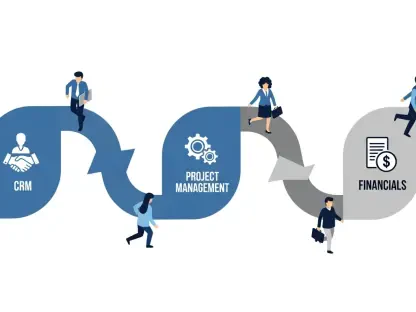Setting the Stage for Regulated Innovation
Imagine a healthcare provider racing to deploy a cutting-edge patient management system, only to be stalled by stringent data privacy laws that threaten penalties for non-compliance. This scenario encapsulates a critical challenge in regulated industries: balancing the need for rapid cloud innovation with the ironclad requirements of compliance. Enter GitLab Dedicated on AWS, a single-tenant cloud solution born from a strategic collaboration between GitLab, a leader in DevSecOps platforms, and Amazon Web Services (AWS), a titan of cloud infrastructure. Tailored for sectors like healthcare, finance, and government, this partnership promises to bridge the gap between agility and regulation.
The significance of this solution lies in its ability to address a persistent tension. Regulated industries often grapple with fragmented toolchains and inefficiencies due to the fear of violating laws like HIPAA or GDPR. By leveraging AWS’s global infrastructure, GitLab Dedicated offers a pathway to scalable, secure cloud adoption without sacrificing compliance. This review delves into how this technology reshapes the DevSecOps landscape for organizations bound by strict regulatory oversight.
In-Depth Analysis of Features and Performance
Robust Compliance and Security Framework
At the core of GitLab Dedicated is its ability to ensure compliance through a meticulously designed security architecture. Utilizing AWS’s infrastructure, the platform provides data residency, isolation, and private networking within customer-selected AWS Regions. This setup is crucial for adhering to critical regulations such as GDPR and HIPAA, which demand strict control over where and how data is stored. For industries under constant regulatory scrutiny, this feature minimizes risks while enabling the benefits of cloud scalability.
Beyond basic compliance, the solution aligns with emerging mandates like the EU Sovereign Cloud requirements. This ensures that data remains within specific geographic boundaries, a non-negotiable aspect for many European organizations. The ability to customize deployment regions adds a layer of trust, allowing businesses to operate confidently in highly regulated environments without fear of legal repercussions.
The security framework also mitigates the inherent risks of cloud adoption. By isolating workloads in a single-tenant environment, GitLab Dedicated prevents unauthorized access and data breaches, a common concern in shared cloud systems. This robust architecture positions the platform as a reliable choice for entities prioritizing data sovereignty and protection over mere operational efficiency.
AI-Powered DevSecOps Enhancements
Another standout aspect is the integration of artificial intelligence to elevate DevSecOps workflows. GitLab Dedicated incorporates self-hosted large language models for secure code analysis, ensuring that vulnerabilities are identified and addressed without exposing sensitive data to external systems. This innovation is particularly valuable in regulated sectors where even minor code flaws can lead to significant compliance violations.
Additionally, the GitLab Duo Agent Platform, currently in public beta, facilitates seamless collaboration between developers and AI agents. This tool enhances productivity by automating real-time compliance checks and offering actionable insights during the development cycle. Such capabilities reduce the burden on teams to manually monitor for regulatory adherence, allowing focus on innovation rather than risk management.
The competitive edge of these AI-driven features cannot be overstated. In environments where post-deployment issues can result in costly penalties, the proactive detection of vulnerabilities and compliance gaps adds immense value. This forward-thinking approach differentiates GitLab Dedicated from traditional DevSecOps tools, making it a game-changer for organizations seeking both security and speed.
Strategic Market Reach and Positioning
From a market perspective, the collaboration with AWS empowers GitLab to tap into high-margin segments of the software-as-a-service arena, particularly within regulated industries. The partnership enables penetration into sectors previously hesitant to adopt cloud solutions due to compliance barriers. With AWS’s vast reach, GitLab can now cater to a broader clientele, from financial institutions to government agencies, with tailored offerings.
A notable upcoming initiative is the AWS European Sovereign Cloud, set to enhance GitLab Dedicated’s appeal in Europe by hosting data strictly within EU borders. This aligns with the region’s stringent data sovereignty laws, addressing a key concern for European businesses. Such strategic moves underscore GitLab’s intent to dominate in regions with complex regulatory landscapes.
Looking at broader industry trends, the demand for compliance-driven DevSecOps solutions is surging, with market growth projected at over 20% CAGR in the coming years. GitLab’s positioning as a frontrunner in this space highlights its potential to lead a transformative shift. By prioritizing compliance as a core feature rather than an afterthought, the platform sets a new standard for cloud adoption in sensitive sectors.
Practical Implementations and Sector-Specific Impact
Healthcare: Safeguarding Sensitive Data
In healthcare, where patient data protection is paramount, GitLab Dedicated proves its worth by enabling secure, AI-powered workflows. Hospitals and providers can now develop and deploy applications without risking exposure of personal health information to public cloud vulnerabilities. The platform’s isolation features ensure that data remains within compliant boundaries, fostering trust among stakeholders.
This capability extends to supporting innovative projects, such as telemedicine platforms or AI-driven diagnostics, which require both speed and security. By automating compliance checks during development, the solution reduces the likelihood of regulatory missteps, allowing healthcare organizations to focus on patient outcomes rather than legal hurdles. Such practical applications demonstrate the platform’s real-world utility in a critical sector.
Finance and Government: Meeting Rigorous Standards
Similarly, in finance and government, where oversight is unrelenting, GitLab Dedicated offers a robust framework to navigate complex regulations. Financial institutions can leverage the platform to build secure transaction systems while adhering to laws governing data privacy and fraud prevention. The ability to isolate workloads ensures that sensitive financial data is shielded from external threats.
For government entities, the solution provides a means to modernize infrastructure without compromising national security or citizen privacy. Whether it’s developing public service portals or internal systems, the compliance-first approach aligns with mandates that prioritize data control. This adaptability across diverse regulatory needs showcases the platform’s versatility in high-stakes environments.
Emerging Opportunities in Other Sectors
Beyond established sectors, GitLab Dedicated holds potential for expansion into areas like pharmaceuticals and defense. In pharmaceuticals, where research data is both valuable and heavily regulated, the platform can secure intellectual property during collaborative development. Its compliance tools ensure that trials and innovations proceed without regulatory interruptions.
In defense, the need for secure, isolated environments for software development is even more pronounced. GitLab Dedicated can support mission-critical applications while meeting strict governmental standards for data handling. These emerging use cases illustrate the platform’s capacity to address niche regulatory challenges, opening doors to untapped markets.
Navigating Challenges and Limitations
Complexity of Global Compliance
Despite its strengths, GitLab Dedicated faces hurdles in maintaining compliance across a patchwork of global regulations. Different regions and industries have unique requirements, often creating a maze of standards that vary by customer. This complexity can strain resources and necessitate continuous updates to the platform to remain aligned with evolving laws.
To counter this, ongoing innovation and strategic partnerships are essential. Collaborations with local regulatory bodies or technology providers can help tailor solutions to specific markets. While challenging, this adaptability is crucial for sustaining trust among clients who operate under diverse legal frameworks.
Market Risks and Competitive Pressures
Market risks also loom, particularly around product differentiation. With competitors vying for a share of the DevSecOps space, GitLab must clearly articulate its unique value to avoid being perceived as a generic cloud solution. Mixed analyst sentiments reflect concerns over whether the platform can maintain a distinct edge in a crowded field.
Addressing these risks requires a focus on customer-centric enhancements and showcasing measurable outcomes. By highlighting success stories and investing in features that directly tackle user pain points, GitLab can reinforce its standing. The partnership with AWS provides a strong foundation, but consistent differentiation remains a priority for long-term success.
Reflecting on a Transformative Journey
Looking back, the exploration of GitLab Dedicated on AWS revealed a groundbreaking approach to DevSecOps that tackled the intricate balance of innovation and compliance with finesse. Its robust security architecture, AI-driven capabilities, and strategic market positioning stood out as pillars of strength. For regulated industries, this technology carved a path to cloud adoption that was both secure and scalable.
Moving forward, organizations should consider piloting GitLab Dedicated to address specific compliance challenges within their sectors, leveraging its customizable features to align with local regulations. Stakeholders are encouraged to monitor the rollout of initiatives like the AWS European Sovereign Cloud for opportunities to expand into new regions. As the DevSecOps landscape evolves, staying ahead will require embracing such solutions to not only meet today’s demands but also anticipate tomorrow’s regulatory shifts.









